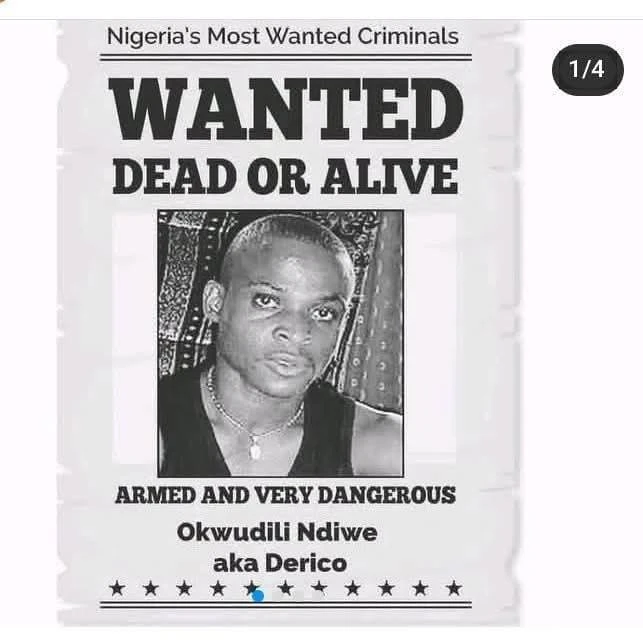 Abdulazeez Abubakar
3 months ago
Abdulazeez Abubakar
3 months ago
Overview
Derico Nwamama: One Of The Most Feared Armed Robbers In Nigeria’s History
In the bustling town of Aguleri in Anambra State, sometime in the late 1970s, a child was born who would one day haunt the nightmares of southeastern Nigeria. His name was Okwudili Ndiwe, but the world would come to know him as Derico Nwamama.
Like many young boys in the chaotic Nigeria of the 1990s, Okwudili grew up amidst poverty, instability, and the lure of fast money. His first steps into crime were small pickpocketing, snatching purses in the busy markets of Onitsha and blending into the crowd like a ghost.
But Derico was no ordinary petty thief. He was daring, cunning, and dangerously ambitious.
As the years passed, Derico began to build a name in Onitsha’s criminal underworld.
His turning point came when he eliminated another feared criminal, known as Chiejina. That brutal act wasn’t just a gangland execution, it was a power grab, and from that moment, Derico was king.
He quickly formed a heavily armed gang, carried out bank robberies, interstate bus ambushes, and orchestrated mass killings. His cruelty stunned even hardened criminals. His operations were meticulously planned: he lived luxuriously in Abuja, only returning to the East to strike. After each heist, he vanished untraceable and untouchable.
By the year 2000, Derico had become a walking legend. Stories circulated that bullets couldn’t pierce his skin, that he was protected by powerful charms from native doctors.
He openly boasted: “No man born of a woman can kill me.”
Derico’s gang became notorious for:
Bank robberies, often leaving behind blood and destruction.
Highway ambushes, especially on the roads between Onitsha, Asaba, and Agbor.
Threat letters to the police, warning them not to touch his men.
Killings of robbed passengers sometimes for fun and sometimes to eliminate witnesses.
His most horrifying crime occurred in December 2000, at Upper Iweka, Onitsha. Derico stopped a 59-seater bus returning from Lagos. After robbing the passengers, he opened fire and killed almost everyone. Only four survived.
That massacre marked a turning point for him. Derico was no longer just a thief. He was now Nigeria’s Public Enemy Number One.
The people were terrified, and the police were helpless. Even the then Governor of Anambra State, Dr. Chinwoke Mbadinuju, had no solution. Derico seemed supernatural, vanishing before arrest, striking unexpectedly, and killing without mercy.
In May 2001, the police launched a formal manhunt: Operation Derico. Several of his gang members were arrested, including his trusted bike rider, Amobi, but Derico remained elusive. He mocked the security forces, and in June 2001, he even raided a police station to seize weapons, preparing for a massive bank heist. His confidence was so high, he started collaborating with other gangs for larger, more daring robberies.
With the police outmatched, Governor Mbadinuju turned to the Bakassi Boys; a feared vigilante group known for brutal justice. These were no ordinary men. Armed with machetes, talismans, and native charms, the Bakassi Boys stormed Anambra.
In July 2001, they captured Derico alive in Onitsha. Shirtless, bruised, and terrified, he was paraded through the streets, no longer the invincible phantom he once claimed to be.
And then, in front of a massive crowd at Ochanja Market, the Bakassi Boys carried out their judgment.
They executed Derico Nwamama by machete.
No trial. No lawyers. Just the blade and the roar of a people finally free from fear.
His death was widely seen as justice served, a symbolic end to an era of terror. Yet it also raised troubling questions about vigilante justice and the failure of Nigeria’s formal security institutions.
Derico's story has since become part of street folklore and urban legend across Nigeria.
In 2004, a Nollywood film titled “Derico Nwamama” dramatized his life and crimes. His name is still referenced in songs, street interviews, and discussions on crime, symbolizing the dark height of unchecked violence in southeastern Nigeria.
To this day, older residents in Anambra speak of him not as a myth, but as a real, terrifying force that once ruled the streets.
https://www.facebook.com/share/p/1JXsuLiyS8/



